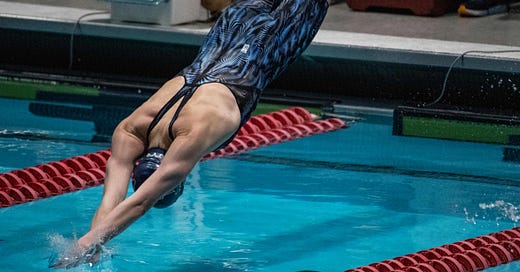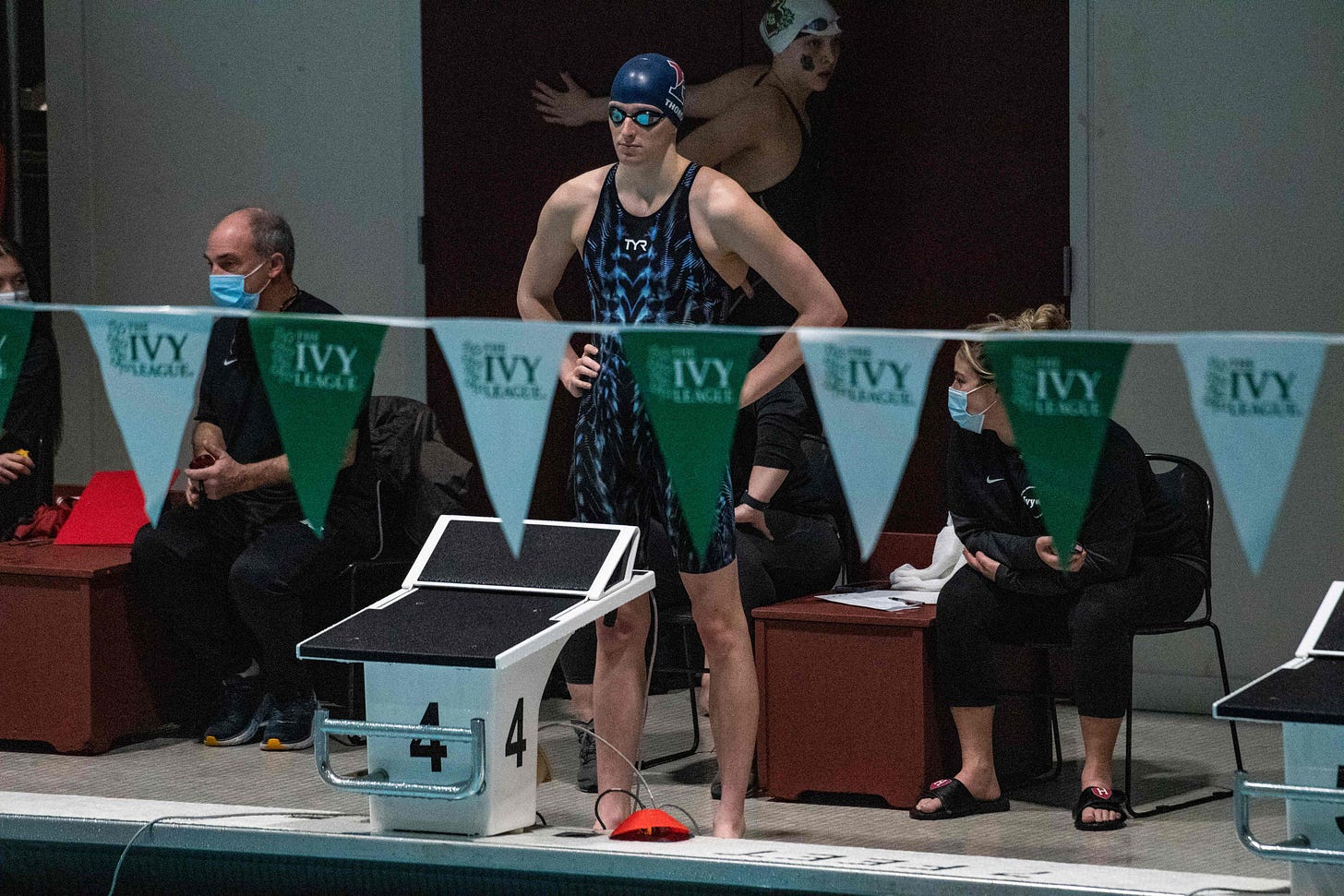
The Free Press

Watching Lia Thomas swim is more relaxing than watching the other swimmers on the women’s team. Thomas glides easier—her competitors in the Harvard pool have to kick much more frequently than she does but get less far—and her shoulders almost swallow the straps of the one-piece running down the center of her back as her body torques. She’s better at swimming. She’s built for it.
Thomas, 22-years-old and a fifth-year senior, is the star swimmer on the Penn women’s team—and a transgender athlete who swam for her first three years on the men’s. The tallest swimmer on her team by at least a head, she has to crouch a little to get in the Quakers’ huddle.
Thomas started making headlines in early December, when, at the Zippy Invitational in Akron, she set two national records in the 500- and 200-yard freestyle events. She beat her closest competitor, another Penn swimmer, in the 1,650-yard freestyle by 38 seconds. Since then, she has continued to smash records.
Lia Thomas isn’t just a swimmer. She’s become a totem in the culture wars, making abstract debates—about the tradeoffs between inclusion and fairness, about the tension between identity versus biology, and about the complications of treating sex as a mental fact and not a chromosomal one—real and radioactive. Her presence—and dominance—in the water has been confounding observers and many of the parents gathered at the Harvard pool to watch the Ivies. They wonder whether they are witnessing the beginning of the end of women’s sports.
The first Women’s Swimming and Diving Championship for the Ivy League took place in 1977, five years after Title IX became federal law. This year’s championship, which started on Wednesday and ended late Saturday, is the seniors’ last chance to swim for their team, unless they make it to the NCAA Division I finals, and the whole thing feels like a party.
Some of the Princeton girls have big orange cowboy hats on. Cornell has red, heart-shaped sunglasses. The Dartmouth crowd sports wacky headbands with bouncing puffs of green fuzz on the end. They play radio edits of pop songs during warm ups and between events, and, at every possible moment, the girls are screaming. They are jumping up and down at the edge of the pool, cheering and shrieking for their teammates in the relay and during all the heats. Each school has an elaborate call-and-response cheer.
By the pool, Thomas is closed off. She wears black headphones and sits on a metal bench under the Penn flag near a Costco-sized box of Welch’s fruit snacks, a bag of clementines, and a box of KN95 masks.
I sit as close as I can to the pool deck, next to the dad of a Brown swimmer. “I’d point my daughter to you, but she told me I’m not allowed to point,” he tells me. I ask him what he thinks of Lia Thomas. “I see someone who is beating people badly, and it’s not fair,” he says as we watch the first heat of the 500-yard freestyle prelims, a race that Thomas ends up winning by seven-and-a-half seconds. “But I’m also seeing that people aren’t talking to her, her teammates aren’t encouraging her. She’s like an island, alone. It can’t feel good to know that there’s nobody in the stands who is happy you won.”
Ben Timlin, 34, drove over from Arlington, Massachusetts to “witness history.” He’s not into women’s swimming or sports, but he’s been following the story. “I’m rooting for the girl from Penn to smash all types of records so I can see everyone's head explode,” he says. “It’s the same reason why it was fun to watch Donald Trump. It was a wrench in everything.”
On Thursday, when Thomas posts a pool record for the 500, winning by about a half a length of the 25-yard pool, Timlin stands up and pumps his fists.
Thomas, an economics major with a minor in classics, is from Austin and started swimming at the age of five. When she swam on the men’s team, Thomas never made it to the NCAA Championship. Now, Thomas is seeded number one in the league and is poised to give Katie Ledecky a run for her money next month at the NCAA championships.
Carole Hooven, the co-director at Harvard’s Department of Human Evolutionary Biology and the author of the book “T: The Story of Testosterone, the Hormone that Dominates and Divides Us,” is an expert on the biological differences between men and women. Hooven notes a few of the differences, on average, between those who have gone through male puberty and those who have not: taller heights and longer wingspans, larger bones, and hearts, greater lung capacity, the structure of male-adapted muscles that are easier to build and harder to lose, and lean body mass. Some of these traits can be tamped down with drugs. Others can’t.
“Men don’t have an advantage over women because of one of these factors, but all of them put together,” Hooven says.
“It is not fair for women to race against transgender Lia Thomas,” tweeted female tennis champion Martina Navratilova recently. Diana Nyad, the legendary female swimmer who is the only person to swim between Florida and Cuba unaided, wrote in The Washington Post that “no amount of analysis can erase male puberty’s advantages. Perhaps a fairer plan is to give competitions a new ‘open’ classification: Cisgender, transgender, intersex—all are welcome.”
Many of the parents I spoke to say they’d be fine with Thomas swimming in the male category or a category all her own, as Nyad suggests. They aren’t trying to hurt anyone’s feelings or exclude anyone outside of the necessarily exclusive and biologically defined area of women-only sports. They don’t seem to have a problem with Iszac Henig, a Yale student and a trans man (who doesn’t have the advantages from male puberty), swimming in the women’s events. (Thomas reportedly wore a one-piece and went by “she” her junior year while on the men’s team.)
It also feels cruel to hit out at Thomas—who would choose to make themselves the target of such vitriol? Plus, she’s technically following all of the rules of the Ivy League and the NCAA. But when Thomas wins by half a length, it’s a huge deal, and the blame has to lie somewhere.
Most parents in the stands lay it at the feet of the NCAA. They had expected that the NCAA would impose some clarity. Instead, in January, the NCAA announced that when it came to transgender athletes, it would defer to the governing bodies of each and every sport. Three weeks ago, U.S.A. Swimming announced its new guidelines, which are pretty extensive. For example, a transwoman now has to have her testosterone tested, and clear the 5-nanomoles-per-liter threshold for 36 months. This apparently caught the NCAA by surprise, prompting the organization to double back and announce that it would be unfair to transgender swimmers to implement the new U.S.A. Swimming guidelines this late in the game.
All this means that Thomas will get to compete at the NCAA championships next month. And that the parents of the female swimmers she’s trouncing are very annoyed.
One Penn dad, whose daughter swims against Thomas in distance events, tells me he places the blame “squarely on the NCAA.” His wife chimes in: “The NCAA has done biological women, and her, wrong and they need to fix it.” A Brown dad says the NCAA ruling adds up to “weasel words.” A Princeton dad tells me that “either the people supporting this are on the wrong side of history, or it’s the end of women’s swimming.”
The parents’ longer-run fear is that college coaches will start recruiting trans athletes, and that female athletes who have worked tirelessly in high school won’t get a fair shot. They say their daughters can’t reasonably train harder, lift more, or do anything to overcome the biological facts that make Thomas impossible for them to beat. The NCAA and Ivy League are essentially telling their daughters, they say, to set their hopes on second place.
When Thomas won the 500 free, I started chatting with a security guard. What did he think when she won? “Speechless,” he said. “Just speechless.” What did he think the solution was? Will the league change course? “Nothing will change. This is Harvard. There’s no controversy. No racists,” he said. Then, with a wink, “Everyone is equal.”

The pool deck gets more stuffy as the meet wears on. And the more Thomas swims, the taller she becomes. The Brown dad guessed six-foot-one in the morning. A Princeton dad was sure her frame was six-foot-three. “She must be six-foot-five or six-foot-four,” a Harvard dad told me after Thomas won, during the one-meter diving finals.
One Penn dad puts it plainly: “No amount of hormone suppression will ever roll back the advantages Lia possesses because of male puberty.” He thinks Thomas isn’t giving her all. “You can tell when a swimmer is coasting or really digging in,” he says. “Lia’s swimming is like ‘la la!’”
He and his wife, plus another Penn mom, tell me that their daughters tell them that Thomas seems oblivious to all the discussion around her. “They haven’t asked our girls how they feel about any of this,” says the mom. “My daughter is a female, and Lia has dated females, and now she’s in the locker room with male parts.”
But the Penn couple thinks that Thomas’s comfort has come at the expense of their own daughters’ who they say have received “veiled threats” from the university when it comes to speaking out. At the meet, the announcer opens with a warning against “racist, homophobic, or transphobic discrimination.”
So it is no surprise that not one of the swimmers would speak to me; nor have they spoken on the record to any other reporter. It’s not that they haven’t considered it. “One of the swimmers on their team called my daughter and asked if they were to put out a statement, if the Harvard swimmers would too,” a Harvard dad told me on Friday night.
I’m told that the Princeton girls are “freaking out.” Sixteen Penn swimmers sent a letter to Penn and the Ivy League urging them to uphold USA Swimming’s decision, which set forth much stricter guidelines for trans athletes than the NCAA’s. Three hundred other swimmers sent another letter to the NCAA in support of Thomas. There have been a ton of statements, too, from Penn (“Penn Athletics is committed to being a welcoming and inclusive environment for all our student athletes”); Michael Phelps (“sports should be played on an even playing field”); and Caitlyn Jenner (“We cannot have biological boys competing against women. It’s bad for the trans community”).
The Penn parents tell me there’s yet another letter coming down the pike, this one organized by them with the help of former Olympian Nancy Hogshead-Makar, which argues that Thomas’s participation is unfair. That one has 3,000 signatures, including from more than 100 olympians and Hall of Fame swimming coaches.
These are Ivy League parents. They have opinions about everything. They will tell you that lanes four and five have the least turbulence. They will explain how there’s a $400 swimsuit that you can only wear once, but that might be worth it for the tenth of a second.
But as history unfolds in front of their noses, they refuse to comment.
One mom told me that she was happy that Lia gets to compete as her true self, before changing her mind and insisting that I delete my recording of our interview. After I spoke to one dad, his wife contacted me begging to take his name off the record. She thought that the consequences for speaking would be “severe” and texted: “Please don’t hurt my child!”
As much as wingspan, heart size, lung capacity, bone density, or nanomoles of testosterone per liter of blood, the story of Lia Thomas is a story about the Ivy League and the class of people that tends to populate it. These kids and their parents are ultra-competitive—in swimming, in schooling, and socially. In some cases, these families passed up scholarships to D1 schools so that the kids could swim for Columbia, or Dartmouth or Cornell or Yale and pick up a more elite diploma along with a varsity letter. Getting here meant a decade or so of early practices, endless carpools, faraway meets, college visits, charity projects, SAT prep and AP classes.
But getting in doesn’t mean an end to the prep and the striving. There are still job prospects, summer internships, and graduate school admissions to worry about. They love prestige, and they love rules. Rules got them and their kids where they are; these are the highest-scoring rule-followers in the country. But now the rules—Thomas has followed all of the Ivy League and NCAA ones—have turned on them. “Whether you think it or not, you can’t go against her,” says the Brown dad. “No one wants to take the hard stance because they don’t want to be demonized.”
One of the Penn moms says her own daughter warned her against speaking out. “She’s worried about getting into grad school, and she doesnt want my name or hers to come up on Google attached to this.” (Her daughter is hoping to get a graduate degree in biology.)
The parents say their daughters know it’s wrong that Thomas is swimming against them but that they will not risk getting smeared with the label transphobe.
What about Mike Schnur, the Penn coach, who is wearing a mask with a trans flag on Saturday night, where Thomas swims in the 100 yard freestyle? “Politically, he’s as conservative as they come,” says a Penn dad. “He just loves winning and loves his job.” A Penn mom stares at me. “Everyone’s just faking everything.”
On Friday, before the 200-yard freestyle, I spoke with Schuyler Bailar, the first trans athlete (he transitioned to male) in D1 sports who swam for the Harvard's men team from 2015 to 2019. Now a full-time transgender activist, Bailar organized the 300-person letter in support of Thomas. Bailar said those opposed to Thomas are driven by little more than bigotry.
“Most people aren’t saying ‘We hate trans people,’ because they’re not allowed to say that, but they’re disguising it by saying ‘We care about fairness,’’’said Bailar, “It’s an insidious form of propaganda.”
Bailar went to sit with Thomas’s parents. Thomas’s mom reached for him, grasping her heart. He and the dad shook hands. The Thomas’ looked preppy: The parents wore glasses and striped shirts; Lia’s older brother, who also swam for Penn, was in khakis.
Thomas ended up swimming a 1:43:13, a new record for both the pool and the Ivy Meet. A few minutes later, she is awarded her medal on the tallest podium.
My fellow reporters are scrolling through Twitter minutes after that race. Out of the corner of my eye I can read, “SHAMEFUL: Penn’s Lia Thomas picks up victory in 200 free at Ivy League Championships, sets meet record.” I can’t help but look back at her parents, who I’m sure just want everyone to leave their kid alone. A spectator stands up and waves the transgender flag—light pink and baby blue stripes—but packs it up and heads out after Thomas’s race.
In the three days I spent at Harvard’s pool I watched Thomas win the 500-yard freestyle, the 200-yard freestyle and the 100-yard freestyle. In every race, she made the pool record. In the 100 and 200 free, she set the Ivy record too. In second place for that race was Henig, the trans swimmer from Yale.
In a few moments, Thomas will hoist herself out of the pool. She’ll receive a high five from some, and a cold shoulder from others. Then, she’ll collect her third medal of the meet. For now, Thomas and Henig embrace while they bob in the water.
If you missed our conversation with Carole Hooven about testosterone on Honestly, please listen here:














Good for these females and coaches and schools! It's dangerous. Period
If Suzy wrote this in 2024 maybe she would use the correct pronoun for Thomas: HE. Finally women are rising up and forfeiting games where there is a fake woman - witness the 3 women's volleyball teams NOT playing San Jose State due to a male on the team.